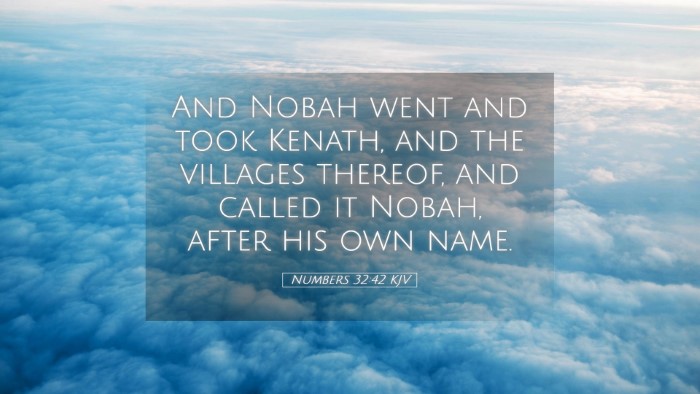Commentary on Numbers 32:42
Verse Context: Numbers 32:42 states, "And Moses gave Gilead unto Machir the son of Manasseh; and he dwelt therein." This passage occurs within the broader narrative of the Israelites' journey to the Promised Land and the allocation of territories among the tribes. The discussion here reveals both the historical context and theological implications pertinent to the larger narrative of redemption.
Introduction
This verse highlights the leadership of Moses in distributing the land among the tribes, and specifically mentions the allocation to Machir, the son of Manasseh. The weight of this moment is compounded by its placement within the larger historical and spiritual journey of Israel, reflecting themes of inheritance, legacy, and divine promise.
Insights from Public Domain Commentaries
Matthew Henry's Commentary
Henry underscores the significance of land allocation as a fulfillment of God's promises. He emphasizes that Moses' leadership is instrumental in ensuring that the tribes receive their inheritance as decreed by God. Machir's receipt of Gilead suggests a distinction made for courage and service in battle, aligning with tribal lineage and divine favor.
Key Points:
- Faithful Leadership: Moses exemplifies what it means to lead with integrity, emphasizing the leader's role in executing God-given directives.
- Theological Importance of Inheritance: The land is not just a physical territory; it symbolizes the fulfillment of God's covenant with His people.
- Courage and Service: Machir’s inheritance reflects recognition for his contributions, advocating that service in the kingdom often leads to blessings.
Albert Barnes' Notes on the Bible
Barnes offers a detailed historical perspective, shedding light on Machir's significance within the tribe of Manasseh. His commentary integrates genealogical insights, indicating that Machir was part of a notable lineage that held favor in the eyes of God. His inheritance served to reinforce the notion of divine providence and continuity of God's promises through generations.
Highlighted Aspects:
- Genealogical Context: Understanding Machir's background provides depth to the narrative; it illustrates how God works through familial lines to fulfill His promises.
- Divine Providence: The allocation of land to Machir and his descendants affirms God's ongoing presence and guidance through Israel’s history.
- Legacy and Continuity: The passage captures the significance of legacy as a theme in biblical scripture, particularly in relation to the faithfulness of both God and His people.
Adam Clarke's Commentary
Clarke's interpretation delves into the practical implications of the land inheritance system. He notes that Gilead was a fertile area, suggesting that Machir's family was provided with a significant blessing. Clarke argues that this allocation serves as a testament to God's goodness and justice, reinforcing the necessity for equitable distribution among the tribes.
Major Observations:
- Practical Blessing: Clarke emphasizes the material benefits of the land, advocating that spiritual blessings often manifest in tangible ways.
- Equity in Distribution: The method of land allocation reflects God's concern for fairness and justice among His people.
- Spiritual Symbolism: Gilead symbolizes not just physical sustenance but also a place of spiritual refuge and community for the descendants.
Theological Implications
This verse and the accompanying commentaries illuminate several theological themes:
- God’s Faithfulness: The allocation reflects God's unwavering commitment to His promises, illustrating that divine plans are executed even through human agency.
- Leadership and Responsibility: Moses’ role highlights the responsibility of leaders to act justly and in accordance with God’s will.
- Covenantal Relationship: The narrative underscores the importance of covenantal relationships and the inheritance of promises across generations.
Application for Today
The lessons from Numbers 32:42 are relevant for modern readers, especially leaders within the church and faith communities:
- Understanding the weight of responsibility that comes with leadership and the importance of making decisions aligned with God's principles.
- Recognizing the significance of legacy in one’s faith journey, as well as encouraging discernment in passing on faith to future generations.
- Appreciating the material and spiritual blessings that can arise from faithful service and the importance of generosity in sharing resources within the community.
Conclusion
Numbers 32:42 is a pivotal scripture that summarizes significant themes of leadership, inheritance, and divine promise in the narrative of Israel. By examining this verse through the lens of esteemed commentaries, we gain a richer understanding of the text’s implications both in its historical context and its application for contemporary believers. This verse stands as a testimony to God's faithfulness and the continuous unfolding of His promises throughout history.


